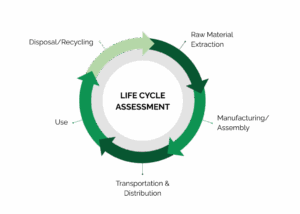LCA: A powerful tool for change
In the early days of sustainability, we were often driven by a desire to “save the polar bears” or protect rainforests. Today, business leaders are asking a different question. It’s no longer “Is this the right thing to do?” but “Is this worth the investment?”
The answer is yes, and Life Cycle Assessment (LCA) can help prove it.
So, what exactly is an LCA?
LCA is a tool that measures the environmental footprint of a product or service across its life cycle. It helps you understand your product’s environmental footprint, find opportunities to improve and communicate your sustainability credentials with confidence.
This means LCA gives you a snapshot of your product or services’ footprint, both what goes into it and what comes out. That includes:
- what goes in, like energy and raw materials
- what comes out, like waste, water pollution and carbon emissions.
The lower the impact, the smaller your product’s environmental footprint. Click here to learn more in thinkstep-anz’s Need to Know guide.
From burden to business case
LCA can seem complex and overwhelming. It’s sometimes seen as a data-heavy, costly exercise. But when you look at it through a business lens, LCA becomes a strategic tool. It can help you build resilience, drive innovation and gain market advantage.
Around the world, LCA is gaining traction. In the EU, it’s a requirement for Horizon funding. In Australia, the 2024 Building Ministers’ Meeting endorsed LCA as part of the National Construction Code for commercial buildings. EPD Australasia just celebrated 2,000 Environmental Product Declarations. In China, national funding for LCA research is growing rapidly.
Business success starts with transparency
LCA takes a full-life approach. It looks at a product’s environmental impact from raw materials to disposal. This broad scope gives you visibility – and with visibility comes opportunity. One client asked, “What if we find something we don’t like?” That’s the point. Finding an issue means you can improve it.
LCA is also a great tool for carbon reporting. It supports eight of the fifteen scope 3 categories, including purchased goods and services, transport, product use, and end-of-life. It provides a solid foundation for calculating your corporate carbon footprint.
A tool for engagement and collaboration
LCA brings teams together. You’ll need input from finance, marketing, sales, product development, procurement and sustainability. In working together, these teams start to share a common understanding of environmental impact. This builds stronger relationships and leads to better business decisions.
For example:
- Finance provides data on material purchases
- Sales gains stories to engage customers
- Marketing keeps communications credible and compliant
- Product teams identify improvement opportunities
- Procurement starts more meaningful supplier conversations
Turning insight into impact
Because it covers a product’s full life cycle, LCA can link directly to your business goals. It helps you:
- Reduce risk through responsible procurement
LCA helps you identify high-impact materials and suppliers. That means you can manage environmental and reputational risks early, before they reach your customers or regulators. It’s especially useful if you’re exporting to markets like the EU or Australia, where environmental performance is becoming a license to operate. - Innovate and explore new markets
LCA gives your R&D and product teams the insights they need to design better products. Whether it’s switching to low-impact materials or rethinking how a product is made or used, LCA supports innovation. It can also help you meet pre-qualification requirements for green building projects, government tenders, or international buyers. - Lift productivity with engaged staff
When teams work together to collect data and understand impacts, they start to think differently about how their work affects the environment. This shared purpose can boost morale, improve collaboration, and lead to more efficient processes. - Build supply chain resilience
LCA uncovers where your materials come from and where your biggest environmental impacts sit. This visibility helps you find more sustainable, reliable suppliers and reduce dependence on vulnerable resources or locations. - Back up marketing and investor messaging with credible data
More customers and investors are demanding proof to back up sustainability claims. LCA provides a robust, science-based way to support your product claims and environmental performance, helping you avoid greenwashing. - Meet regulations through end-of-life insights
Regulations around product stewardship and waste are tightening in Aotearoa New Zealand. LCA can show you the downstream impacts of your products and help you prepare for rules around recyclability, reuse or take-back schemes.
In short, LCA does not just measure impact, it creates business value.
A tool for today’s leaders
It’s time to flip the script. LCA isn’t a burden. It’s a strategic advantage. In a world of fast-changing regulations, investor demands and consumer expectations, it helps you stay ahead.
Done well, LCA can strengthen your brand, futureproof your business and deliver a real return on investment.
Life Cycle Assessment isn’t just worth doing -it’s essential.
Want to know more? Get in touch with Barbara Nebel at thinkstep-anz.



